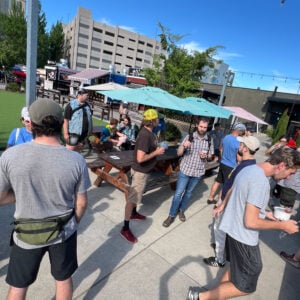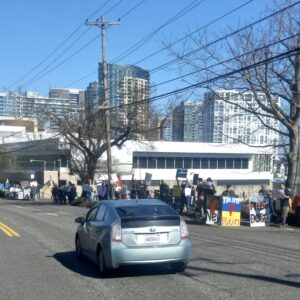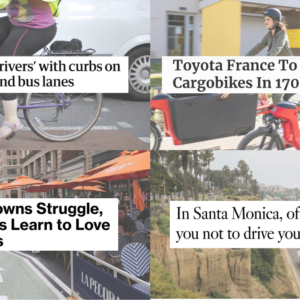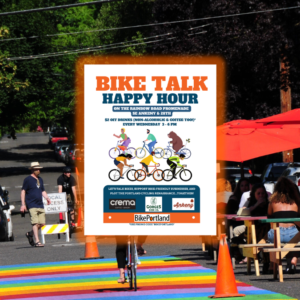There are many ways that being bike-friendly impacts a city’s bottom line. We might not always be able to quantify it with a study or whip out statistics to back it up, but the impact is real. One demonstration of that impact I’ve noticed a lot since doing this site is how our reputation for being bike-friendly draws new residents and businesses to the area.
Here are just two stories I came across in the past few days that confirms this phenomenon.
Yesterday, The Oregonian’s Silicon Forest blog reported that OVP Venture Partners, “arguably Oregon’s most visible venture capital firm”, recently moved into a building just south of the Hawthorne Bridge. Here’s the snip from The O (emphasis mine):
“If you were to ask me five or 10 years ago: ‘Where should we be?’ I would have said Beaverton or Hillsboro,” Gerry said.
Contemporary startups tend to be focused on software or Web services, which don’t require large numbers of employees or big offices in the suburbs. And today’s Northwest entrepreneur tends to be younger, Gerry added, with specific lifestyle aims.
“That sort of young, hip talent pool…really like commuting by bike or public transit and don’t want to fight 217 or 26,” he said.
Then comes this story from the News Gazette in Champaign, Illinois:
“When Daniel Penner and Anona Whitley yearned for a change of scenery, they didn’t just hop on a plane and head some place warm. Instead, the two former Champaign Cycle employees decided to move to Portland, Ore., and experience all the scenery along the way from the top of their bicycles.
Neither of the 23-year-old biking enthusiasts owns a car and they were attracted to the bike-friendly atmosphere of Portland.
“We’ve chosen not to own cars,” Penner said. “If you’re going to do that, Portland is the place to be…
… Whitley has recently landed a job with a women’s sporting apparel company, Team Estrogen. She is looking forward to commuting to work on her bike.
So far Portland is everything they had hoped for – friendly people, plentiful bike trails, excellent public transportation and mild weather.
“A lot of it has to do with being environmentally conscious, but we just love riding bicycles and would rather do that than drive cars,” Penner said.”
I’m no economist, but it seems to me that — especially in this economy — anything that draws businesses and smart young people to your city is a good thing.








Thanks for reading.
BikePortland has served this community with independent community journalism since 2005. We rely on subscriptions from readers like you to survive. Your financial support is vital in keeping this valuable resource alive and well.
Please subscribe today to strengthen and expand our work.
But wait, don’t bikes hurt our businesses? I could have sworn I heard that somewhere… 😀
(just to be clear, not implying it was you, Jonathan)
Okay, but has Portland’s bikey rep dissuaded any people, or businesses from coming here? It is possible, you know? And that would offset the benefit.
This too. What quality of people and businesses? Low quality businesses and people aren’t much of a benefit. A low-quality business is one without much of a post-fad plan, and a low-quality person is some one who would ignore this, and open up anyway.
Plus, I think it is unfair to the whole community to be all, “Portland is this…”, and, “Portland is that…”. The reality is bicyclists and environmentalists are still a minority in the community, and I fail to see how this minority can be used to characterize an entire city.
We have just as many antique car-enthusiasts here as bikers. In fact, there’s an international Concourse held in Hillsboro annually. Judging by turn-out at motorsports events in the area, I might go as far as to say there are more antique-car and motorsports enthusiasts here, than bikers.
How would you like it if every word out of these people’s mouths were, “Portland, a car-friendly city.”? “Portland is a top car-city.”? And so on?
‘Cause it is, you know? Huge custom car industry here, quite huge.
portland does have its share of snarky naysayers, though. maybe we could promote the city on that theme.
Vance,
If Portland’s bikey rep dissuades anyone from moving here I’ll take that as a plus.
portland is definitely a place for dreamers but here is the caveat. If you come to Portland, don’t stay. There are so many other places that could use the help of creative youngsters. I think you should come to portland, almost as a sabbatical and then leave taking with you all valuable lessons in cultural rennaissance.
I found that when I moved to Philly a few years ago, after living in Porltand for a spell, that my Portland “street cred” was worth a lot. People are always like, “oh, you’re from Portland!?” I love it there. Now, how about a job and house,” Sound good?
My previous consulting job gave me the flexibility to choose where I live. All I needed was a convenient airport and an internet connection. I chose PDX over all other cities. Now I’m “all in” with a bicycle-based business that would not be possible in another city. When my business grows and I hire employees, I will owe a debt of gratitude to PDX in all that it is.
are – #4 See, there you have it right there. I’m not big on, “Promoting”, cities. Good gravy man, we’re in a bit of a seller’s market here, don’t ya think? What good is promotion doing at this point? And who decides what we promote? A lifestyle decision by a tiny fraction of the city, or the hobbies of another?
See, Oregon is, has been, and who knows what in the future, a Libertarian strong-hold. This has always been bolstered by a steady trickle of rural-area high-school grads from around the state trickling in here. Oregon used to be the last bastion for the nuts. This is not a liberal-state, nor is it particularly Green.
What’s happened in the last few years is a dramatic turn-around in small-town culture around the state, and the influx of newcomers finally acting to homogenize rather than to simply add.
It’s my opinion that the Oregon which is promoted to the tourists is a very different Oregon than actually exists. To me, I see transplants coming here for things that simply aren’t here, but are, “promoted”, as being here. What I’m railing against is what I see as a concerted effort to change Oregon into what the brochure says it is, when the real Oregon has so much more to offer the nation, and our state’s citizens.
BicycleDave #5 – Man I get the joke, but I have actually lost two opportunities due to people’s perception of Portland, as outsiders. So, what’s a joking matter to you, and point well-taken I might add, is actually of serious consequence to me. I have two out of state business associates involved in two separate start-ups that are going to Denver, not here. I could have really used the opportunity. In the end, Sustainability and Transportation policy is what kept them out.
Pretty small-time in the big-picture, but rest assured not everybody who is put off by the politics here is qualified for the, “Good riddance.”, category.
The difference, Vance, is that there are LOTS of “top car cities”. If you like cars and driving, homes are cheap in Detroit right now. Not to mention Houston, LA, and Dallas, where cars are definitely king and the weather is warmer. There are very few US cities with Portland’s particular crunchy vibe. Others may have some of the same features but no one seems to have the package Portland does.
The bike scene is part of what I love about living here. If it also brings in venture capitalists and sporting-goods manufacturers – and Zaphod – I’m really ok with that. 🙂
also – what was it about the sustainability and transportation policy that kept your business associates out? I’m generally in favor of these policies and curious about instances where it doesn’t work. assuming, of course, that they didn’t just want to dump crap in the willamette and drive hummers everywhere. 😉
E #9-10 – Ya, both service concepts in the sub $5 mill range. Both $1 mill a year grossers. Both with over a hundred employees. The Parking Impact studies here alone exceeded the purchase-price of an entire 7500sft space in Denver’s LoDo. Chris told me his cost projections on that study looked to exceed $300k. Never mind compliance. Which would have more than doubled that number.
One is a large-scale lighting guy turned service-concept entrepreneur. The other the head of a venture-capital firm oriented around service-concepts. Either one of these guys would just buy me a bar here, but won’t, ‘CAUSE THE EFFING HATE PORTLAND!!!!!!!!!!!!
The indoor smoking ban (Though D has one too, just not as nazi), community liaisons, no parking, unregulated insurers, parking studies, urban-renewal obligations, and on, and on, and on. In the end, they are the type to pay extra in hopes of getting extra. But the, “vibe”, you allude to in your comment, a false, new-comer vibe IMO, is what I think it really boils down to.
There’s no money in bikes. By the time there is, poor people won’t have a hope in hell. As such, bikey businesses don’t gross big numbers. Not the kind of big our economy needs. THIS, my friend, is unsustainable.
Keep in mind the assertion is that bike-businesses are categorically good for all businesses here. The reality is, and I just illustrated one example, they’re just not. Now don’t take that as they shouldn’t be here, but do restrain yourselves in your proclamations, eh?
vance, is there nothing you will not shit on?
There is no money in bikes.
please use the google bikeportland function and type in “bike economy.”
Rogue Helicopter, anyone?
The bike economy of Portland looks a bit impressive when spun correctly but it is largely comprised by retailers paying low wages and boutique builders that don’t employ many and are producing just enough to get by. Chris King Components is a “big fish” in the local bike economy but hardly a blip on the overall local economic radar. Face it, $63 million is not that much money in the grand scheme of things. For perspective, that the annual revenues for two Fred Meyer stores or a single Costco location.
If a Cannondale or Trek type operation set up HQ here providing many highly paid positions and spurring the need for many support businesses then we would have something to crow about.
Vance is essentially right and that ticks off many here. Get outside the BikePortland bubble and you will see that bikes and bike dollars, while fashionable and growing, are a pittance compared to other economic engines.
Lazy Spinner,
yes, the bike economy is small. everyone understands that. However this story illustrates things that are not apparent by looking only at company revenues. Many people are moving here, paying taxes here, buying houses here, inventing things here, starting business here, etc… because of our bike-friendly reputation.
And Vance,
you make some interesting points, but I think they go a bit beyond what this story is about.
Jonathan,
Two published anecdotes mentioning bikes does not indicate a measurable trend. I’d like to see a real statistical analysis that supports this theory rather than a feature article based on two press clippings.
I’d love to think bikes are driving some real and badly needed economic growth here but I also believe that a Google search would find many more articles citing climate, politics, scenery, microbrew, affordable housing, thriving music scene, and a few other factors that create a stronger case than that presented here.
I am moving my family and business to PDX next year because I want my business located in a place that supports healthy and clean alternatives to commuting as well as a place that supports local business. My company is based on helping the small design firm build their business, so buying local is what we are all about.
Lazy Spinner,
“a measurable trend”. I didn’t say that, you did.
Sorry it was not more clear but I repeat, this story was not meant as a serious research finding of the regional bike economy.
And on a related note… if it WERE possible to measure the case of strength of the various things you list as drawing people here, I would wager that our bicycling and transportation reputation are at the top of that list.
Vance (#3) said “has Portland’s bikey rep dissuaded any people, or businesses from coming here?”
It would be good if it did. Eventually, we’re going to have to get to a zero-growth scenario. Better now than later. True sustainability requires a steady-state economy and population. Granted, that’s never been attempted in the US – perhaps in certain areas in Europe, which in itself is another reason to court the European models of transportation, business, and public administration.
The American obsession with growth is killing us – quite literally.
Lazy Spinner (#15) – “The bike economy… is largely comprised by retailers paying low wages and boutique builders that don’t employ many and are producing just enough to get by.”
You just described the average small business, which employs a large portion of the Portland MSA. Businesses with less than 20 employees make up nearly 20% of the workforce here, and 15% of all payroll receipts. Chris King is somewhat larger than that – I don’t have statistics for the 20-50 employee range (and I think King is actually a larger org than that) or above.
“I’d love to think bikes are driving some real and badly needed economic growth here but I also believe that a Google search would find many more articles citing climate, politics, scenery, microbrew, affordable housing, thriving music scene, and a few other factors that create a stronger case than that presented here.”
I would argue for the interconnectedness of bikes and microbreweries.
I like Portland; thanks for being so welcoming 🙂 I try to boost the economy as much as I can…